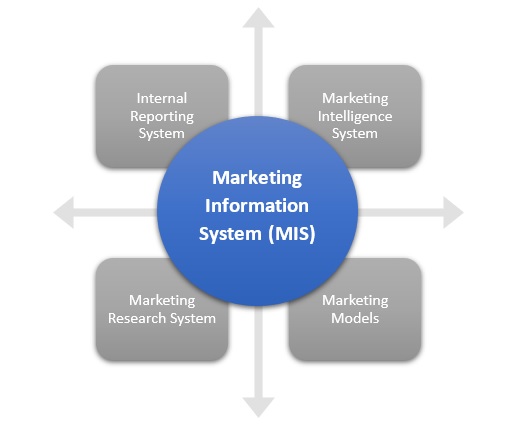- Business Concepts ›
- Marketing and Strategy ›
- Marketing Information System (MIS)
Marketing Information System (MIS)
Definition, Importance, Components & Example
This article covers meaning & overview of Marketing Information System (MIS) from marketing perspective.
What is meant by Marketing Information System (MIS)?
Marketing Information System (MIS) or MKIS is a system or tool having data stored systematically for making business decisions. Marketing Information System or to say a tool that ensures that raw data that is obtained from various sources is used to take proper strategic decisions. It is through MIS that the companies of today’s world are able to compute marketing data and draw meaningful conclusions. MIS helps in business as the collection, analysis, dissemination and reporting of data has become easy and with upcoming software advancements, large amount of data gets analysed easily.
Importance of Marketing Information System (MIS)
Recent advancements in the field of IS and IT have enabled the marketing department to process raw data and to take up fruitful strategic decisions regarding marketing mix and other components of marketing. MIS is a tool used for marketing information management. Marketing Information system (MIS) is the software and hardware system which analyses and accesses the market information which is obtained through primary or secondary research and kept in the database. Nowadays many companies use MIS to support them in taking complicated and long lasting decisions related to product launch, product retract, product development or modification, pricing, packaging changes, distribution channels and network, promotional activities, etc.
The system gathers the data, stores it safely and analyses it in accordance to the information requirements for strategic, control or operational decisions. Apart from the software and hardware systems, the human team involved in analyzing data also forms part of MIS.

Components of Marketing Information System
The following are the components of MIS:
1. Internal reporting system – This includes orders received, inventory records and sales invoices
2. Marketing Intelligence system – It is carried out by the managers themselves in an informal way rather than by professional marketing researchers
3. Marketing research system – Normally carried out by professional marketing researchers and takes the form of purposeful studies
4. Marketing models – Various models are used like: Time series sales modes, Brand switching models, Linear programming, Elasticity models Regression and correlation models, ANOVA models, Sensitivity analysis, Discounted cash flow, Spreadsheet 'what if models
Advantages of Marketing Information System
Some of the pros of having Marketing Information Systems in companies are:
1. The data that is important gets stored
2. The broader perspective of marketing information can be visualized using MIS
3. The collection of data gets organized and later time is saved
4. Crises are easily avoided using MIS as any irregularities can be easily visualized
5. Activity based costing and cost benefit analysis can be carried out easily
6. The coordination between brands becomes easy for companies especially in the field of FMCG when managing large portfolio of products
Disadvantages of Marketing Information System
Some drawbacks or cons of MIS are:
1. There is a high amount of initial labour and capital involved which has acted as a great hurdle for companies not that big in stature and financial might
2. Too much reliance on MIS can make marketers miss trends in the industry
3. There is always some lag between the implementation and fruition of marketing activities which can be misjudged with MIS
4. The complexity of MIS brings in other challenges on the operational aspect for managers and the time spent on understanding these take a toll on the bottom line
Relation Between BIS & MIS
BIS (Business Information System) – There are 4 basic things that every manager does. They are planning, organizing, leading and controlling (POLC). BIS is the computer based system that helps the managers with the decision making related to P-O-L-C effectively and efficiently. It is an amalgamation of computer science, management accounting, management science/theory, behavioural sciences, organisation theory and operations research. MIS is a subset of BIS.
Example of Marketing Information System
The use of MIS can be seen with the membership that big retail stores like Big Bazaar, Reliance Fresh provide with their membership programs. They integrate the user preferences with the help of some unique reference ID or card that they provide. With the help of that they are able to track the frequency of visit the customer has and at the same time they are able to tailor offers for the customer with the help of previous purchase data. The membership at the same time invokes the customer to come to the store for repeat purchases.
Hence, this concludes the definition of Marketing Information System (MIS) along with its overview.
This article has been researched & authored by the Business Concepts Team which comprises of MBA students, management professionals, and industry experts. It has been reviewed & published by the MBA Skool Team. The content on MBA Skool has been created for educational & academic purpose only.
Browse the definition and meaning of more similar terms. The Management Dictionary covers over 1800 business concepts from 5 categories.
Continue Reading:
What is MBA Skool?About Us
MBA Skool is a Knowledge Resource for Management Students, Aspirants & Professionals.
Business Courses
Quizzes & Skills
Quizzes test your expertise in business and Skill tests evaluate your management traits
Related Content
All Business Sections
Write for Us